Every Month the STEM Education Center will highlight one of its many outstanding graduate students who work hard to improve the field of STEM Education.
This month the STEM Education Center would like to spotlight- Laura Fox
Laura Fox has received her B.S. and an M.S. in Chemistry and is pursing her PhD in Chemistry Education through the Curriculum and Instruction department. Her research revolves around improving teaching practices and student understanding in general and physical chemistry. Born in West Chester, PA, Laura is the proud owner of two unique cats, Cedric and Delaware. Laura’s favorite food is her dad’s Italian home cooking and her favorite place to go in Minneapolis is a social dance studio for a night of swing dancing. If Laura had one super power, it would be to apparate like Harry Potter and her favorite color is green. Ms. Fox is a valued member of the STEM Education Center team and we look forward to her many successes to come.
Read about out other highlighted graduate students here
Family and friends, not counselors or clergy, more likely to advise Americans on serious relationship issues
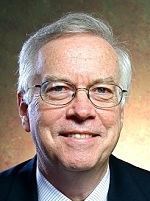 Nearly three-fourths of American adults (73 percent) have been a confidant to someone with problems in a marriage/long-term committed relationship, and these confidants advise on many serious issues, according to new research from the College of Education and Human Development.
Nearly three-fourths of American adults (73 percent) have been a confidant to someone with problems in a marriage/long-term committed relationship, and these confidants advise on many serious issues, according to new research from the College of Education and Human Development.
Led by William Doherty, family social science professor, this is the first study to ever determine how many American adults serve as confidants and advisers when it comes to relationship issues.
“While many people are turning to family and friends to discuss these sensitive topics, we know these confidants are often not equipped with necessary tools to be supportive,” said Doherty, a nationally known expert on marriage. “We found only half of confidants feel confident in their ability to help and about 40 percent feel stressed by these conversations.”
The study identified more than 20 relationship problems that are brought to confidants. Among the top issues were:
- Growing apart (68%)
- Not enough attention (63%)
- Money (60%)
- Considering divorce (58%)
- Infidelity (51%)
Doherty noted that “It’s interesting to see the wide range of problems people are willing to talk about with someone else they trust. Some are everyday issues and some are really serious and life changing.”
The study also showed that confidants who listened, gave emotional support and a helpful perspective, helped the person understand their own contributions to the problem and where their partner is coming from were seen as the most effective.
However, the least effective confidants were those who gave too much or not useful advice, talked too much about their own problems, were too critical of the partner, suggested a break up, or came across too judgmental or critical.
Additionally, the study found that 72 percent of people who have been divorced reported confiding about their problems before they got divorced. They were much more likely to confide in friends and family members than in professional counselors or clergy.
Lastly, according to the study, most Americans have a small number of people they feel comfortable confiding in about a problem in their marriage/long term committed relationship. Two-thirds (67 percent) have 0-2 potential confidants; stated differently, the average person has 1-2 potential confidants.
Read more on the CEHD Vision 2020 Blog and in a USA Today article. Hear Dr. Doherty discuss his research on Minnesota Public Radio.
PsTL’s Miksch publishes opinion piece in The Chronicle of Higher Education
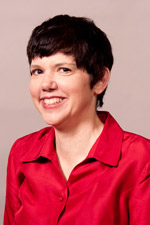 On January 10, 2014, The Chronicle of Higher Education published an opinion piece written by Postsecondary Teaching and Learning Associate Professor Karen Miksch and her colleagues Neal Hutchens (Pennsylvania State University) and Jeffrey Sun (North Dakota State University) entitled “Open-Records Requests and Academic Freedom.”
On January 10, 2014, The Chronicle of Higher Education published an opinion piece written by Postsecondary Teaching and Learning Associate Professor Karen Miksch and her colleagues Neal Hutchens (Pennsylvania State University) and Jeffrey Sun (North Dakota State University) entitled “Open-Records Requests and Academic Freedom.”
The impetus for the column was the recent open-records request made by a conservative private institute seeking the emails, records, and other documents of Gene Nichol, a University of North Carolina law professor and director of the law school’s Center on Poverty, Work and Opportunity. The request was made after the professor published an opinion piece criticizing the Governor of North Carolina, Pat McCrory.
Miksch and her colleagues note, “The problem with the unfolding episode in North Carolina isn’t the desire to challenge Nichol’s views and assertions. The problem is using an open-records request as a strategy to suppress debate. A law intended to add transparency and openness to government operations has been used to harass and silence.”
Read the full article here.
Test Post
Sroufe discusses the ‘clingy child’ in Slate Magazine
 Alan Sroufe, professor emeritus at the Institute of Child Development, talked about the ‘clingy child’ in a January 10 Slate Magazine article: Carry Me!! How to Handle a Clingy Kid by Melinda Wenner Moyer. In explaining some of the clinging behavior of a young child, Sroufe gives the action an evolutionary context. In further discussion, Sroufe mentions the aspects of stress-relief. Overall, however, he says, ‘If it’s stress making them clingy, “far and away the best thing to do is let them be clingy,” Sroufe says. “They will cling as [much as] they need, and then they’ll want to get back to exploring and playing and being with other toddlers and all of that.” You may read the whole article here.
Alan Sroufe, professor emeritus at the Institute of Child Development, talked about the ‘clingy child’ in a January 10 Slate Magazine article: Carry Me!! How to Handle a Clingy Kid by Melinda Wenner Moyer. In explaining some of the clinging behavior of a young child, Sroufe gives the action an evolutionary context. In further discussion, Sroufe mentions the aspects of stress-relief. Overall, however, he says, ‘If it’s stress making them clingy, “far and away the best thing to do is let them be clingy,” Sroufe says. “They will cling as [much as] they need, and then they’ll want to get back to exploring and playing and being with other toddlers and all of that.” You may read the whole article here.
Great Lesson 7: “Family & Community Partnerships that Support Learning”
On Wednesday January 8, teacher candidates in a TERI course, “Cultures, Schools, and Communities,” visited Brooklyn Center High School. The school visit was planned as a key class component of the 7th Great Lesson, entitled “Family & Community Partnerships that Support Learning.”
Michael Goh, co-instructor of the course, emphasized the importance of taking teacher candidate students out of a lecture hall, and bringing them to an authentic setting like Brooklyn Center Community Schools.
“We are constantly studying our design of the Great Lessons to amplify [teacher candidates’] learning experience. To that end, it is especially vital that we are able to bridge theory and practice, and future teachers are able to experience what they read and discuss from our Great Lessons beyond the abstract. We have a unique opportunity to immerse ourselves in a school district that epitomizes family and community partnerships [through] one of the exemplary Brooklyn Center Community Schools.”
Upon arrival, our teacher candidates were warmly greeted by Dr. Carly Jarva, principal of Brooklyn Center High School. The candidates were then met by a group of high school seniors and school staff who graciously gave us school tours showcasing a multitude of integrated services, including an onsite Health Resource Center which provides health, dental, and mental health services for students as well as any community members who are birth to 18 years of age.
During the panel discussion, teacher candidates listened to powerful stories of the panelists’ commitment to creating and strengthening community partnerships that support student learning. Through authentic dialogue about the challenges as well as the opportunities to make students the core of family and community partnerships, our future teachers engaged in deep reflection on the critical role they play within these partnerships.
Many future teachers felt empowered to learn that classroom teachers are an integral part of community building. And their engagement process begins within their own classroom by creating a trusting and supportive community with students and their families. Here are some of student comments after the visit:
“I was totally captivated by the panel of speakers at Brooklyn Center High School. They were so generous with their passion and their time, and I am energized by their words. What I like most of all is that the school and district leaders are rolling up their sleeves and “humbling” themselves in order to precipitate real change in the community and for the students.”
“Brooklyn Center Community School is where I am currently placed, and my first day was the day of Great Lessons. I had done some research prior and have been very observant of the things that BCMS offer to their students including an extensive after school program, health facilities, and supportive/extensive staff. At Great Lessons, I got an even better picture of the services they provide. I am glad that the school values building community and implemented such a great system.”
“I have heard about community schools, and it is great to work in and see one in action. I think such an idea also creates a great school environment with staff, students, and families. I learned a great deal about the concept and can only hope to work in such an environment in the future.”
“As a future teacher, sometimes I get so caught up in how I’ll explain my content or how I’ll manage my own classroom, that it’s easy to forget that students have lives outside of the walls we share, that may affect their academic success. My time at Brooklyn Center, and the panel of speakers, candidly addressed some of these issues, and reminded me that wrap around services in schools can help, not only the student body, but the entire community. It’s a powerful reminder for everyone; until a student’s basic needs are met, they cannot learn.”
Submitted by Shuji Asai, Licensure Officer

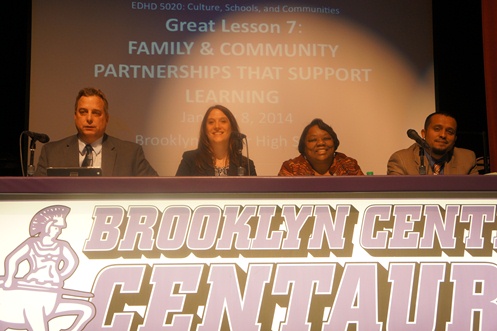
LaVoi and Calhoun publish chapter on sport and new media
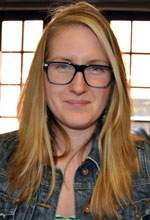
 Dr. Nicole M. LaVoi, teaching faculty in the School of Kinesiology and associate director of the Tucker Center, and Austin Stair Calhoun, Director of eLearning + Digital Strategies in the School of Kinesiology and Ph.D. candidate in sport sociology, have published a chapter, “Digital media and women’s sport: An old view on ‘new’ media,” in the new Handbook of Sport and New Media (Andrew Billings and Marie Hardin, Eds.).
Dr. Nicole M. LaVoi, teaching faculty in the School of Kinesiology and associate director of the Tucker Center, and Austin Stair Calhoun, Director of eLearning + Digital Strategies in the School of Kinesiology and Ph.D. candidate in sport sociology, have published a chapter, “Digital media and women’s sport: An old view on ‘new’ media,” in the new Handbook of Sport and New Media (Andrew Billings and Marie Hardin, Eds.).
Ed Psych’s Sashank Varma presents at Artificial Intelligence conference on Integrated Cognition
 Associate Professor Sashank Varma presented at the Association for the Advancement of Artificial Intelligence (AAAI) Fall 2013 Symposium on Integrated Cognition. This symposium brought together leading researchers in artificial intelligence, cognitive science, linguistics, and allied disciplines to share new progress in understanding the architecture of cognition.
Associate Professor Sashank Varma presented at the Association for the Advancement of Artificial Intelligence (AAAI) Fall 2013 Symposium on Integrated Cognition. This symposium brought together leading researchers in artificial intelligence, cognitive science, linguistics, and allied disciplines to share new progress in understanding the architecture of cognition.
Dr. Varma presented new experimental and computational modeling work on text comprehension, as part of a session on language that included Dr. John Hale at Cornell, Dr. Richard Lewis at Michigan, Dr. Chung-chieh Shan at Indiana, and Dr. David Reitter at Penn State.
DirecTrack to Teaching
DirecTrack to Teaching students have been active in several schools in our partner districts this fall. DirecTrack is a program for undergraduates at the UMN-TC who intend to become secondary (math, social studies, science, English language arts) or k-12 (art, ESL, world language, special education) licensed teachers through our post-baccalaureate initial licensure programs (ILP).
One of the requirements of DirecTrack is to take a course titled Exploring the Teaching Profession. A key component of this course involves service-learning in local schools. This fall, 27 students have been participating in service-learning in several of our partner districts.
• Columbia Heights High School, AVID tutors: 4 students
• Roosevelt High School (MPS), classroom tutors: 9 students
• Wellstone International High School (MPS): 1 student
• Lucy Craft Laney K-8 School (MPS): 2 students
• Adolescent Girls and Parenting Education (AGAPE) (SPPS): 3 students
• Murray Middle School (SPPS): 8 students
A student quote says it best:
“The most rewarding aspect is in the countless number of times I have seen a student that I am tutoring begin to understand something after I explain it to them. I have heard comments from my students that they finally understand something after I explained it to them. To just know that I am actually making a difference in these students’ lives is an incredibly rewarding feeling.”
The staff and students in DirecTrack wish to extend a big thank you to these schools for their support of our students as they continue on their path towards becoming teachers!
STEM Spotlight- Sousada Chidthachack
This month, the STEM Education Center would like to spotlight Sousada Chidthachack
Sousada Chidthachack received her BA in Mathematics and her MA in Curriclum and Instruction from the University of St. Thomas and is working on her Ph.D. in STEM Education at the University of Minnesota. Her projected date of graduation is December 2015 and she works on both the EngrTEAMS and Prepare2Nspire grants in the STEM Education Center. Born in Nakhom Phanom, Thailand, Sousada dreamed of being a reporter for E!News or National Geographic or a talk show host like Oprah. Sousada is the proud owner of a tan pit-bull/boxer named Magnum Rambo who she likes to take to Lake Calhoun and Uptown, her favorite places in Minneapolis. Her favorite color is red and she loves Asian cuisine, more specifically sushi, papaya salad and pad thai. Lastly, if Sousada had one super power it would be to wipe out all student debt for all deserving students. The STEM Education Center is proud to have Sousada Chidthachack as a member of the team, her hard work and dedication to STEM Education is much appreciated.
Learn More about Sousada here
Ed Psych alum Dan Baker publishes book on IDD
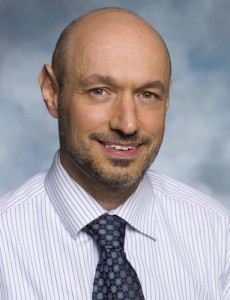 Dan Baker, Ph.D., ’93, Associate Professor of Pediatrics with The Boggs Center at Rutgers Robert Wood Johnson Medical School (RWJMS), recently co-authored the book Mental Health and Wellness Supports for Youth with IDD. The book, one of the first to tackle the issue of youth with intellectual and development disabilities also addresses a wide variety of different concerns regarding improving mental wellness and treating mental health disorders among youth with IDD. Chapters include topics on psychotherapy to psychopharmacology from recognized experts, while maintaining a strong focus on healthy psychological development.
Dan Baker, Ph.D., ’93, Associate Professor of Pediatrics with The Boggs Center at Rutgers Robert Wood Johnson Medical School (RWJMS), recently co-authored the book Mental Health and Wellness Supports for Youth with IDD. The book, one of the first to tackle the issue of youth with intellectual and development disabilities also addresses a wide variety of different concerns regarding improving mental wellness and treating mental health disorders among youth with IDD. Chapters include topics on psychotherapy to psychopharmacology from recognized experts, while maintaining a strong focus on healthy psychological development.
Dr. Baker, who also serves as the Director of Community Positive Behavior Support, Transition, and Supported Employment Projects at RWJMS, has been published in both edited books and literary journals. Most of his published work addresses strategies for teaching direct care staff to work with persons who present challenges. His contributions earned him the 2010 Clinical Practice Award from NADD, an international professional association dedicated to advancing mental wellness for persons with Intellectual or Developmental Disabilities.
Learn more about his publications here.
STEM Spectrum- January Edition
The STEM Spectrum- January Edition is here!
Join our mailing list to receive your own personal copy today!
Or read our newsletter here!
PsTL’s Lee and Williams to publish on intercultural pedagogy
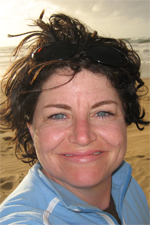
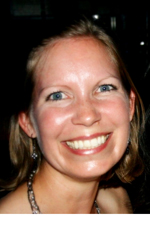 Postsecondary Teaching and Learning department chair Amy Lee and Research Associate Rhiannon Williams have secured a contract with Sense Press to produce an edited volume on intercultural pedagogy. The volume is titled Internationalizing Undergraduate Education: Critical Conversations for 21st Century Practitioners, and intends to support faculty development and institutional capacity to enact policies, supportive structures, and pedagogy that support mindful intercultural learning.
Postsecondary Teaching and Learning department chair Amy Lee and Research Associate Rhiannon Williams have secured a contract with Sense Press to produce an edited volume on intercultural pedagogy. The volume is titled Internationalizing Undergraduate Education: Critical Conversations for 21st Century Practitioners, and intends to support faculty development and institutional capacity to enact policies, supportive structures, and pedagogy that support mindful intercultural learning.
The volume provides theory, pedagogy, and case studies drawn from authentic sites of practice. By their nature, authentic sites of practice are unpredictable and dynamic, providing a context for critical reflection on obstacles, challenges, and the dissonance that occur between theoretical models and the practices for implementation in sites of practice. Addressing the tensions and complexities of varying viewpoints and experiences with internationalization work will challenge readers to think critically about the implications of individual practice as well as unit and institutional structures and support in relation to desired internationalization goals.
Ed Psych’s McGrew publishes in Handbook of Educational Theories
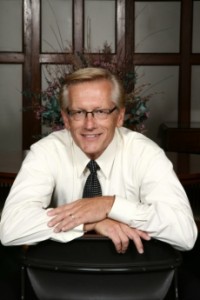 Department of Educational Psychology lecturer Kevin McGrew recently saw his chapter entitled “Individual differences in the ability to process information” published as part of the textbook, Handbook of Educational Theories. McGrew’s chapter presents the integration of individual differences cognitive ability constructs (as per the Cattell-Horn-Carroll theory of intelligence), and cognitive information processing models, in an attempt to integrate these two approaches to understanding cognitive performance.
Department of Educational Psychology lecturer Kevin McGrew recently saw his chapter entitled “Individual differences in the ability to process information” published as part of the textbook, Handbook of Educational Theories. McGrew’s chapter presents the integration of individual differences cognitive ability constructs (as per the Cattell-Horn-Carroll theory of intelligence), and cognitive information processing models, in an attempt to integrate these two approaches to understanding cognitive performance.
Learn more about Kevin McGrew’s research here.
PsTL’s Poch and McNair Scholar Beauclair to present at MMEP in February
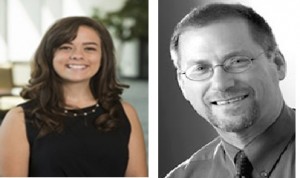 Postsecondary Teaching and Learning Senior Fellow Robert Poch, Ph.D., and McNair Scholar Jade Beauclair have been selected to present at the Minnesota Minority Education Partnership Conference on February 13, 2014. Their presentation, “Lessons, lessons applied: How history informs best practices for the contemporary recruitment, retention, and preparation of teachers of color,” focuses on how pedagogical practices during the U.S. Civil Rights Movement continue to inform contemporary teaching strategies for the success of all students.
Postsecondary Teaching and Learning Senior Fellow Robert Poch, Ph.D., and McNair Scholar Jade Beauclair have been selected to present at the Minnesota Minority Education Partnership Conference on February 13, 2014. Their presentation, “Lessons, lessons applied: How history informs best practices for the contemporary recruitment, retention, and preparation of teachers of color,” focuses on how pedagogical practices during the U.S. Civil Rights Movement continue to inform contemporary teaching strategies for the success of all students.
Learn more about the conference here.
Ed Psych’s Reichle work in Autism Spectrum Disorders links Autism and Somalis in Minneapolis
 As part of his research in behavioral and developmental disabilities in children, Professor Joe Reichle of the Department of Educational Psychology also studies children with variances of Autism Spectrum Disorders (ASD). His work in the area lead to his involvement as a Co-Principal investigator on a study initiated by the University of Minnesota’s College of Education and Human Development (CEHD) to learn more about the prevalence of ASD in White and Somali children living in Minneapolis.
As part of his research in behavioral and developmental disabilities in children, Professor Joe Reichle of the Department of Educational Psychology also studies children with variances of Autism Spectrum Disorders (ASD). His work in the area lead to his involvement as a Co-Principal investigator on a study initiated by the University of Minnesota’s College of Education and Human Development (CEHD) to learn more about the prevalence of ASD in White and Somali children living in Minneapolis.
Learn more about the study here.
Also see media coverage of the findings in the The New York Times, Washington Post/Associated Press, Star Tribune, Minnesota Public Radio, and WCCO-TV, among many other news outlets.
Fall 2013 Road Trip Summary
Road trips for Elementary Education, Curriculum & Instruction, and EDRC staff so far this year include visits to partner sites:
• St. Paul Public Schools: Saint Anthony Park, Frost Lake, and Linwood/Monroe (both campuses)
• Minneapolis Public Schools: Dowling, Lucy Laney, Hall, Andersen, Marcy, Pillsbury, Barton, Roosevelt, Sanford
• Columbia Heights Public Schools: North Park, Highland and Valley View
• White Bear Lake Area Schools: Otter and Lincoln
• Edina: Highlands
Other school sites visited specifically by Elementary Education’s Kathy Byrn include Sioux Trails in Burnsville, Brimhall in Roseville, and XinXing in Hopkins.
We also visited district teams and representatives in Saint Paul, Brooklyn Center, Minneapolis, and Forest Lake.
Next semester we plan to visit the following partner schools that we did not get to this fall:
• Vadnais in WBL
• Nokomis/Sheridan in SPPS
• Crossroads in SPPS
• Lino Lakes in Forest Lake
Also included are these other practicum sites, cluster sites, or potential cluster/PDS sites:
• Harvest, charter
• Harambee, Roseville
• Kenny, MSP
• Kenwood, MSP
• Creek Valley, Edina
• Soujourner Truth Academy, charter
If we haven’t already been there, we look forward to seeing you soon!
Kathy Byrn, Elementary Education Clinical Coordinator
Amy Jo Lundell, Curriculum & Instruction Clinical Placement Coordinator
Jehanne Beaton, TERI/MPS Partnership Liaison @ RHS
Tiffany Moore, TERI/MPS Induction Coordinator
Bob Utke, Clinical Learning Coordinator
Stacy Ernst, School Partner Network Coordinator
Deborah Dillon, Associate Dean of Graduate, Professional and International Programs
Highland Elementary featured in Twin Cities Daily Planet
Highland Elementary in Columbia Heights was featured in a December 15th Twin Cities Daily Planet article titled “Taking teacher training seriously: A medical-style residency program at UofM.” Read the full story.
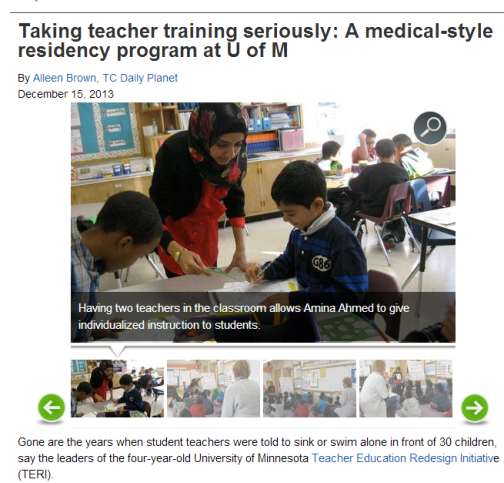 width=”504″ height=”483″ />
width=”504″ height=”483″ />
TERI Partner Network Day: Perspectives
Martha Bigelow moderated an exciting, celebratory panel of recent graduates from CEHD to hear from each their perspectives on how TERI has impacted each as a new teacher. Panelists included Jennifer Eik, Second Languages and Cultures ’13, currently teaching at Roosevelt High School; Callie Moylan, Elementary Education ’13, currently teaching at Lucy Laney K-8; and Ahmed Amin, Social Studies ’11, currently teaching at Roosevelt High School.
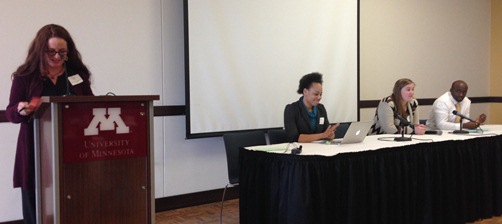
What they said:
“What has prepared me for my teaching was first, and foremost, the Professional Learning Communities (PLCs) that we did in the Great Lessons in the Post Bacc program. We did a lot of identity work and at first, I was resistant… because I just felt like ‘what’s the relevance’ and ‘this isn’t what I signed up for.’ But we did a lot of work on: how we viewed the world, what biases we walked into the classroom with, and how that affects our instruction. Now, looking back on that year, I have to say it was one of the most positively influential years of my life. I learned so much about myself and that’s positively influenced my first year of teaching as I’ve been able to reflect… be more conscious and aware of how I view my students and how I should change my instruction too.”
– Jennifer Eik
“I can attribute my success to the edTPA which very comparable to the Standards of Effective Instruction (SOEI) in Minneapolis Public Schools… the rubrics are almost identical and so having to go through the edTPA and really think about how to create and film a high quality lesson…. That really helped me a lot for as far as knowing what to do, what to have ready, and how to prepare my class. Also, my success as a white teacher in a predominately black school is that– as my principal says — ‘you have to be comfortable with yourself’… and I know I’m a white teacher in a predominately black school but I’m here for the right reason, I’m ready to teach, I want to teach these kids, I believe in these kids, I know they’re smart, and I hope that that attitude is what is reflected in my students’ achievements.”
– Callie Moylan
“By having Jehanne there, placed as the TERI school liaison… doing some work with teachers in research partnerships there on critical pedagogy she came into my class and took that research opportunity to really transformed it so it was student centered and students were creating authentic intellectual work. We were doing fabulous work by the end of that research opportunity…. Having Jehanne there and people like Jenna has really helped my development and has turned around plenty of other classrooms at Roosevelt High school. It’s sort of an invaluable experience having the student teachers come in and see how those methods they’re learning in their program are actually being practiced in the classroom. I think that helps them out also.”
– Ahmed Amin
Transformation through Partnership
Sometimes when you enter into a partnership, you know it’ll be great and that everyone will learn and grow in amazing ways. Sometimes you know it will be good for you, but you’re a little worried. Sometimes you have no idea what will happen, but you just go for it and take a leap of faith. What we know is that transformation through partnership is possible.
With the passing of Nelson Mandela, I was reminded of the word and the concept of “ubuntu” As you know, it’s South African word from the Nguni Bantu language. It is one of those words that can’t be translated into a single word in English. Ubuntu expresses recognition that we are all bound together in our humanity in ways that are not always self-evident, that we can be our best selves by sharing ourselves with others and caring for those around us. Ubuntu if often understood to mean that each of can be who we are because of who we all are, as a unified community.
I feel a sense of Ubuntu through our partnerships. In partnership spaces, I see we are learning about and nurturing the best in all of us. We’re becoming who we are, we’re transforming, because of who we are in partnership.
In partnerships of all sorts, we are persisting through misunderstandings and believing and trusting each other, under assumptions that we are all acting with the best of intentions, despite challenges. We’re doing it for our teacher candidates, for our own growth and we’re especially doing it for Minnesota students and their families.
As you will see from our introductory panel, partnership relationships mean a lot more than merely placing teacher candidates in practicum experiences.
Teacher education programs, like other institutions that are part of the education ecosystem, have the responsibility to respond to immediate challenges and prepare for future needs. Now school partnerships are an inextricable piece of this ecosystem. For example, demographic changes in P-12 schools far outpace changes in the educator workforce. There is widespread under-education of students in mathematics, science and wholesale under-education of students with disabilities and English learners. Furthermore, we need teachers with sufficient training in college and career ready standards and who can use technology to promote engagement and learning. We can remedy these issues through partnership.
Respectful reciprocity based on mutual need is how partnerships in life and in teacher education enable us to change and grow. With the best intentions, the will to see each others’ strengths, move beyond assumptions about who we are, we learn and grow and develop relationships within formal partnerships. It is in through these experiences that partnerships are transformative.
Submitted by Dr. Martha Bigelow, Interim Executive Director of the Educator Development and Research Center
